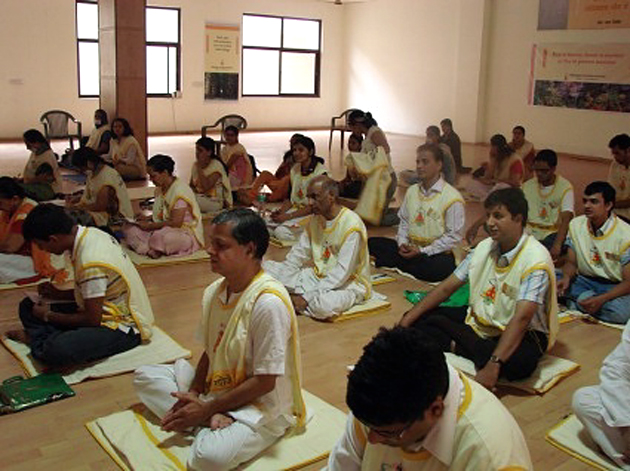
Daily Excelsior

The history of body perception is an old history. It began in the primitive age in which Dharma ruled supreme. In the course of time the tradition became lost. It is being reconstructed now. There is nothing new in the world. That which has grown old assumes a new form. When what has been lost to memory reappears, it is called new. The first experiment in preksha meditation was conducted by Bharata. This experiment remained hidden for a number of centuries. We have reconstructed it. It is a simple process of meditation. A complicated and difficult process of sadhana does not become popular. Man by his very nature avoids that which is difficult. preksha is a simple form of meditations.
The consequence of preksha meditation is the development of the feeling of equality and of consciousness free from duality. This is a new phase of consciousness. The feeling of the duality of gain and loss, pleasure and pain which disturbs, deforms and defiles the mind comes to an end in this phase. Pain and grief are the products of the dialectical operation of the opposite forces of life. A dear son who does not earn and often suffers losses makes his father disgusted with and enraged by him. His love for the son becomes suppressed by anger. This is because the father's mind is conditioned by the experience of pleasure and pain and loss and gain. If he has three sons and only one of them earns, he will be more attached to and affectionate to the earning son. He will disregard the other two and become averse to them.
The awareness of duality creates many problems which have no end. Power and knowledge when opposed by ignorance and passions often fail. If we desire to become free from grief and sorrows and other problems, we will have to put an end to the sense of duality.
No body likes perplexing, problems. That is why he is eager to do away with the feeling of duality. There will be no end to grief and sorrows so far as duality continues. Hence the need to get rid of them.
There is a natural inclination is man in look beyond material objects and pleasures they give. Those who live a life of poverty and want to remain unaware of the inclination; their energies are solely directed towards earning the material means of life. But those who have tasted material pleasures show an inclination to see beyond the material world. Pleasurable experiences are always followed by painful situations and unpleasant feelings. The more one acquires material amenities, the more does he realize that a sea of worries lies ahead. Hence his search for lasting joys which can bear fruit only by a unity of experience.
Everybody remains surrounded by an aura or a circle of light. This light is visible around material objects also. Every nonliving object or gross body also emits rays of light. This is the principle on which photography works. A man even when he has left the place he had occupied can be photographed at the place he has left in absentia. If the light around men and objects were not there, the object or the man cannot be photographed. We cannot see the auro.
However there is a method of perceiving it. Sit down in a dark room in which no ray of light can enter from outside and try to perceive your hand. You will not be able to perceive it, but you will certainly perceive a faint glow of light around it. If you raised both of your hands, you will see light passing from one to the other. There is another well known method. Let two persons sit in a dark room at a distance of twelve thirteen feet from each other.
They will not be visible to each other. But If they are naked they will be able to perceive each other's aura which could not have been perceived in the light. The same holds true about the inclination towards consciousness which is an immaterial entity.
When the darkness (ignorance) caused by sensual pleasures becomes thick, one comes to feel a strong desire to go beyond empherical experience and to experience a state of undivided consciousness. This consciousness is called samayika. It results in a complete restraint of mind and its fickleness. A new life then begins in which there are no anxieties, grief and sorrow.
 Acharya Mahaprajna
Acharya Mahaprajna